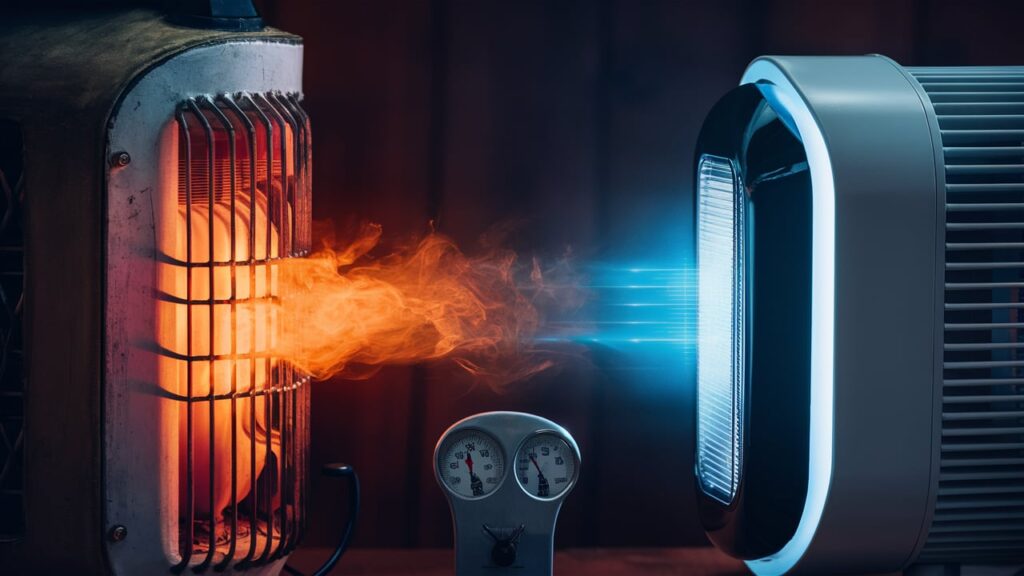Are you wondering if a space heater is the best way to keep your room warm without wasting energy? You’re not alone.
With rising energy costs, finding an efficient heating option is more important than ever. But how do space heaters stack up against other heating methods? You’ll discover the truth about their efficiency and learn how to make the smartest choice for your comfort and your wallet.
Keep reading—you might be surprised by what you find out!

Space Heater Basics
Space heaters are small devices that warm up a room quickly. They are useful for extra heat in cold spots. Many people use them to save on heating bills. Understanding how they work helps you choose the right one. This section explains the basics of space heaters.
Types Of Space Heaters
There are several types of space heaters. The most common are convection, radiant, and fan-forced heaters. Convection heaters warm the air around them. Radiant heaters send heat directly to objects and people. Fan-forced heaters use a fan to blow warm air. Each type suits different rooms and needs.
How Space Heaters Work
Space heaters work by converting electricity or fuel into heat. Electric heaters use wires that get hot when powered. Fuel heaters burn gas or oil to produce warmth. The heat spreads through the room by air movement or radiation. They heat small spaces faster than central heating systems.
Energy Efficiency Factors
Energy efficiency matters most when using a space heater. It helps save electricity and cuts costs. Several key factors decide how efficient a space heater can be. Understanding these can guide you to the right choice.
These factors also affect how well the heater warms your space. Some are about the heater itself. Others depend on the room where you use it.
Wattage And Power Consumption
Wattage shows how much power a heater uses. A higher wattage means more energy consumption. But it also means faster heating. Choosing the right wattage depends on your needs. Too high wastes energy. Too low may not warm enough.
Thermostat And Temperature Control
A thermostat controls the heat output. It turns the heater off when the room is warm. This avoids extra energy use. Good temperature control saves electricity. It keeps the room comfortable without overheating.
Insulation And Room Size Impact
Room size affects heating efficiency. A small heater in a large room uses more power. Insulation keeps warmth inside the room. Poor insulation makes heaters work harder. Better insulation means less energy is needed.
Comparing Space Heaters To Central Heating
Comparing space heaters to central heating reveals clear differences in cost, heat spread, and use. Both systems warm rooms but do so in unique ways. Understanding these differences helps choose the right option for each situation.
Cost Differences
Space heaters cost less upfront than central heating systems. They use electricity directly and can heat small areas efficiently. Central heating requires more investment for installation and fuel. Running central heating often costs more due to heating the whole house.
Heat Distribution
Space heaters warm only the area around them. This means heat is focused and fast but limited to one room. Central heating spreads warm air through ducts or pipes to many rooms. This creates even heat but takes longer and uses more energy.
Usage Scenarios
Space heaters work well in small spaces or for quick warmth. Ideal for bedrooms, offices, or single rooms. Central heating suits larger homes and long-term use. It keeps the entire house warm during cold seasons without extra effort.
Tips To Maximize Space Heater Efficiency
Maximizing the efficiency of a space heater helps save energy and reduce costs. Small changes in how you use and care for your heater can make a big difference. Follow these easy tips to get the best heat and keep your space cozy.
Proper Placement
Place the heater in a central spot for even heat. Keep it away from walls and furniture to avoid blocking airflow. Avoid placing it near windows or doors to reduce heat loss. Ensure the heater is on a flat, stable surface for safety and efficiency.
Maintenance Practices
Clean the heater regularly to remove dust and dirt. Dust can block vents and reduce heat output. Check the power cord and plug for damage. Replace filters if your heater has them. Regular maintenance keeps the heater working well and saves energy.
Using Timers And Smart Controls
Use timers to run the heater only when needed. Set the heater to turn off when you leave the room. Smart controls can adjust temperature based on your schedule. These tools prevent wasting energy and keep your space comfortable.
Safety Considerations
Space heaters offer quick warmth but come with safety risks. Understanding these risks helps prevent accidents. Follow safety steps to keep your home safe and cozy.
Fire Hazards
Space heaters can cause fires if placed too close to flammable items. Keep heaters at least three feet away from curtains, furniture, and papers. Avoid using heaters near bedding or clothes. Never leave a space heater running unattended. Always turn off the heater before sleeping or leaving the room.
Electrical Safety
Use space heaters with proper electrical ratings. Plug heaters directly into wall outlets, not extension cords. Extension cords can overheat and cause fires. Check cords regularly for damage or fraying. Avoid overloading circuits by not using multiple high-power devices on one outlet. Unplug the heater when not in use to save energy and reduce risks.
Safe Operating Guidelines
Place heaters on flat, stable surfaces to avoid tipping. Use models with automatic shut-off features for extra safety. Keep children and pets away from heaters. Read the manufacturer’s instructions carefully before use. Clean heaters regularly to prevent dust buildup. Regular maintenance keeps the heater working safely and efficiently.
Environmental Impact
Space heaters affect the environment in different ways. Their impact depends on how they use energy and what kind of energy they use. Understanding these effects helps us choose better heating options. This section explores the environmental impact of space heaters with a focus on carbon footprint and energy sources.
Carbon Footprint Comparison
Space heaters create carbon emissions when they use electricity or fuel. Electric heaters may seem clean, but their carbon output depends on the power plant. Coal or gas plants produce more carbon than renewable sources like wind or solar.
Fuel-based heaters burn oil or gas, releasing carbon dioxide directly into the air. This increases the home’s carbon footprint quickly. Electric heaters can be cleaner if the electricity is green.
Energy Source Influence
The type of energy used affects the space heater’s impact. Electricity from renewable sources lowers pollution. Solar, wind, or hydroelectric power cuts carbon emissions drastically.
Natural gas or oil heaters rely on fossil fuels. These fuels add carbon to the atmosphere and cause pollution. Choosing electric heaters with clean energy reduces harm to the planet.
Cost Savings Analysis
Understanding the cost savings of using a space heater helps you decide if it fits your budget. Heating your home can be expensive. Space heaters offer an option that may reduce costs. This section breaks down the savings over time and ways to lower your energy bills.
Short-term Vs Long-term Savings
Space heaters often cost less upfront than central heating upgrades. They provide quick warmth in small areas. This can lower energy use immediately, especially in rooms you use often.
Long-term savings depend on how you use the heater. Running it all day can increase your bills. Using it only when needed saves money over time. Quality and energy efficiency also affect long-term costs.
Energy Bill Reduction Strategies
Set your space heater on a timer or thermostat. This prevents overheating and saves power. Close doors and windows to keep heat inside the room. Use fans to spread warmth evenly. Lower your main thermostat to balance heating costs.
Choose energy-efficient models with good safety features. These use less electricity and reduce risks. Regular maintenance keeps the heater running well. Combine these steps for better savings and comfort.
Frequently Asked Questions
Is A Space Heater More Efficient Than Central Heating?
Space heaters are often more efficient for heating small spaces. They use less energy by targeting specific areas. Central heating heats the entire home, which can waste energy. Using a space heater can reduce overall heating costs when used properly.
How Much Energy Does A Space Heater Consume?
A typical space heater uses between 750 to 1500 watts. Energy consumption depends on heater size and usage time. Using a thermostat can help optimize energy use. Always choose an energy-efficient model for best savings.
Can A Space Heater Reduce My Heating Bills?
Yes, space heaters can lower heating bills when used selectively. Heating only occupied rooms saves energy compared to heating the whole house. Combining space heaters with proper insulation maximizes cost savings. However, overuse can lead to higher electricity costs.
Are Space Heaters Safe To Use Indoors?
Modern space heaters are safe with proper precautions. Keep them away from flammable materials and never leave them unattended. Use models with automatic shut-off features for added safety. Follow manufacturer instructions to prevent fire hazards.
Conclusion
Space heaters can save energy when heating small spaces. They use less power than central systems in these cases. Choosing the right size and type matters a lot. Always consider safety and proper use to avoid risks. For big rooms, central heating might work better.
Space heaters offer a simple way to stay warm quickly. They fit well in rooms you use most. Think about your needs before buying one. Small steps can lead to better energy use at home.








